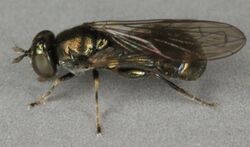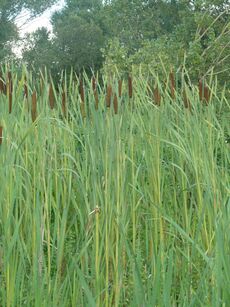Biology:Neoascia tenur
| Neoascia tenur | |
|---|---|

| |
| Neoascia tenur Trawscoed, North Wales | |
| Scientific classification | |
| Domain: | Eukaryota |
| Kingdom: | Animalia |
| Phylum: | Arthropoda |
| Class: | Insecta |
| Order: | Diptera |
| Family: | Syrphidae |
| Subfamily: | Eristalinae |
| Tribe: | Brachyopini |
| Subtribe: | Spheginina |
| Genus: | Neoascia |
| Species: | N. tenur
|
| Binomial name | |
| Neoascia tenur (Harris 1780)[1]
| |
| Synonyms | |
Neoascia tenur is a Palearctic species of hoverfly.[6][7]
Description
For terms, see Morphology of Diptera
Wing length 3-5 ·25 mm. Tibiae 1 yellow with the dark ring. Metatarsae 1 yellow with the dark patch, other segments of tarsi 1 yellowish. Females: abdomen not as broad as N. meticulosa.
The male genitalia are figured by Barkemeyer & Claussen (1986) [8]
Larvae and puparia described and figured by Maibach and Goeldlin (1993) .[9]
See references for determination.[10]
[11]
[12][13]
The male genitalia are illustrated by Barkemeyer and Claussen (1986) [14]
Distribution
Palearctic Fennoscandia South to Iberia and the Mediterranean basin. Ireland east through Europe into Turkey and to European parts of Russia and on to Siberia. [15][16]
Biology
Habitat: Wetlands, flushes and streams in blanket bog, raised bogs, fen, wet grassland, pond and lake margins and along brooks.[17] Flowers visited include Caltha, Cicuta virosa, Filipendula ulmaria, Potentilla erecta, Ranunculus, Salix repens. [18] The flight period is April to September. The larva is sub-aquatic within stem sheaths of Typha and other water plants.
References
- ↑ 1.0 1.1 Harris, M. (1780). An exposition of English insects. Decads III, IV. London: Robson Co.. pp. 73-99, 100-138, pls. 21-30, 31-40. https://www.biodiversitylibrary.org/item/226006#page/5/mode/1up. Retrieved 16 July 2021.
- ↑ 2.0 2.1 Meigen, Johann Wilhelm (1822). Systematische Beschreibung der bekannten europäische n zweiflugeligen Insekten. Hamm: Dritter Theil. Schulz-Wundermann. pp. x, 416, pls. 22–32. https://www.biodiversitylibrary.org/item/49298#page/7/mode/1up. Retrieved 14 April 2019.
- ↑ 3.0 3.1 Kanervo, E. (1934). "Einige neue Syrphiden aus Petsamo". Annales Botanici Societatis Zoologicae-Botanicae Fennicae "Vanamo" 14 (5): 115-135.
- ↑ Gravenhorst, J.L.C. (1807). Vergleichende Uebersicht des Linneischen und einiger neuern zoologischen Systeme. Goettingen: Dieterich. pp. xvi + 476 pp.
- ↑ Zetterstedt, J. W. (1838). Dipterologis Scandinaviae. Sect. 3: Diptera, pp. 477-868. In his Insecta Lapponica. Lipsiae [= Leipzig]. pp. vi + 1,140.
- ↑ Stubbs, Alan E.; Falk, Steven J. (1983). British Hoverflies: An Illustrated Identification Guide (2nd (revised) ed.). British Entomological & Natural History Society. p. 271, xvpp. ISBN 0-9502891-3-2.
- ↑ Fauna Europaea
- ↑ Barkemeyer, W. & Claussen, C. (1986) Zur Identitat von Neoascia unifasciata (Strobl 1898): mit einem Schlussel fur die in der Bundesrepublik Deutschland nachgewiesenen Arten der Gattung Neoascia Williston 1886 (Diptera: Syrphidae). Bonn.zool.Beitr., 37: 229-239.
- ↑ Maibach, A. & Goeldlin de Tiefenau, P. (1993) Description et clé de détermination des stades immatures de plusieurs espèces du genre Neoascia Williston de la région paléarctique occidentale (Diptera, Syrphidae). Bull.Soc.ent.Suisse, 66: 337-257.
- ↑ Van Veen, M. (2004) Hoverflies of Northwest Europe: identification keys to the Syrphidae. 256pp. KNNV Publishing, Utrecht.addendum
- ↑ Van der Goot,V.S. (1981) De zweefvliegen van Noordwest - Europa en Europees Rusland, in het bijzonder van de Benelux. KNNV, Uitgave no.32: 275pp. Amsterdam.
- ↑ Bei-Bienko, G.Y. & Steyskal, G.C. (1988) Keys to the Insects of the European Part of the USSR, Volume V: Diptera and Siphonaptera, Part I. Amerind Publishing Co., New Delhi. ISBN:81-205-0080-6.
- ↑ Coe, R.L. (1953) Diptera: Syrphidae. Handbks.ident.Br.insects, 10(1): 1-98. R.ent.Soc.London. pdf
- ↑ Barkemeyer, W. & Claussen, C. (1986) Zur Identitat von Neoascia unifasciata (Strobl 1898): mit einem Schlussel fur die in der Bundesrepublik Deutschland nachgewiesenen Arten der Gattung Neoascia Williston 1886 (Diptera: Syrphidae). Bonn.zool.Beitr., 37: 229-239.
- ↑ Fauna Europaea
- ↑ Peck, L.V. (1988) Syrphidae. In: Soos, A. & Papp, L. (eds.) Catalogue of Palaearctic Diptera, 8: 11-230. Akad.Kiado, Budapest.
- ↑ Speight, M.C.D. (2011). "Species accounts of European Syrphidae (Diptera)". Syrph the Net, the database of European Syrphidae 65: 285pp. http://www.diptera.info/downloads/StN_Species_Accounts_Glasgow_2011.pdf.
- ↑ de Buck, N. (1990) Bloembezoek en bestuivingsecologie van Zweefvliegen (Diptera, Syrphidae) in het bijzonder voor België. Doc.Trav. IRSNB, no.60, 1-167.
External links
- Images and further information at BoldSystems
Wikidata ☰ Q10797543 entry


